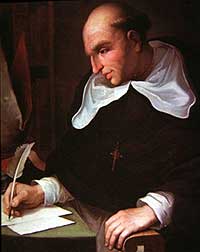|
|
Bartolomé de Las Casas (1484 – July 17, 1566) was a 16th century Spanish priest, the first ordained in the New World and the first Bishop of Chiapas. As a settler in the New World, he was galvanized by what he saw to become famous for his advocacy of the rights of Native Americans in the face of brutal torture and genocide at the hands of Spanish colonialists. His pamphlet A Short Account of the Destruction of the Indies (Brevísima relación de la destrucción de las Indias), published in 1552, gives a vivid description of the atrocities committed by the conquistadors in the Americas – most particularly, the Caribbean, Central America, and what is now modern Mexico – including many events to which he was a witness. In one of his last works before his death, De thesauris in Peru, he vigorously defended the rights of the natives of Peru against the native slavery imposed by the early Spanish Conquest. The work also questions the right of property Spain had in taking the treasures derived from the ransom to free Atahualpa (the Inca leader), as well as those valuables found and taken from the burial sites of the indigenous population.
He was born in Seville, probably in 1484, although 1474 is the traditional date. Dedicated to King Philip II of Spain, Las Casas explained that he supported the acts of barbarism when he first arrived in the New World, but that he soon became convinced that the horrendous acts would eventually lead to the collapse of Spain itself in an act of Divine retribution. According to Las Casas, it was the responsibility of the Spanish to convert the Indians, who would then be loyal subjects of Spain, rather than to kill them. To avoid the burden of slavery on them, Las Casas proposed that African Negroes be brought to America instead, though he later changed his mind about this when he saw the effects of slavery on Africans. Largely due to his efforts, the New Laws were adopted in 1542 to protect the Indians in colonies.
He also wrote the monumental Historia de las Indias and was the editor of Christopher Columbus' published journal. He was instrumental, on his repeated return trips to Spain, in gaining the temporary repeal of the encomienda regulations that established virtual slave labor gangs in Spanish America. Las Casas returned to Spain and was eventually able to bring about the great debate of 1550 in Valladolid between Las Casas and the advocate for the colonists, Juan Ginés de Sepúlveda. Though the encomienda system triumphed, championed by the colonial Spanish classes who were profiting from it, the writings of de las Casas were translated and republished across Europe. They influenced the essayist Montaigne's views of the New World.
His attempt to create a more equitable colonial society in Venezuela, in 1520, was brought down by his colonial neighbors, who were able to incite a native rebellion against him.
Some accounts claim that Las Casas was descended from a converso family, that is, Jews who were forced to convert to Christianity.
His published accounts are central documents in the "Black Legend" of Spanish colonial atrocities.
He died in Madrid.
See also
Further reading
Bartolomé de Las Casas, The Devastation of the Indies, a Brief Account. Translated by Herma Briffault. Johns Hopkins University Press, Baltimore, 1974. ISBN 0801844304
External link
- Bartolome de las Casas (http://oregonstate.edu/instruct/phl302/philosophers/las_casas.html): brief biography and links
- The Las Casas-Sepúlveda Controversy:1550-1551 (http://userwww.sfsu.edu/~epf/2001/hernandez.html) by Bonar Ludwig Hernandezda:Bartolomé de Las Casas
de:Bartolomé de Las Casas es:Bartolomé de las Casas fr:Bartolomé de Las Casas it:Bartolomeo de Las Casas ja:バルトロメ・デ・ラス・カサス nl:Bartolomé de Las Casas nn:Bartolomé de Las Casas no:Bartolomé de Las Casas

